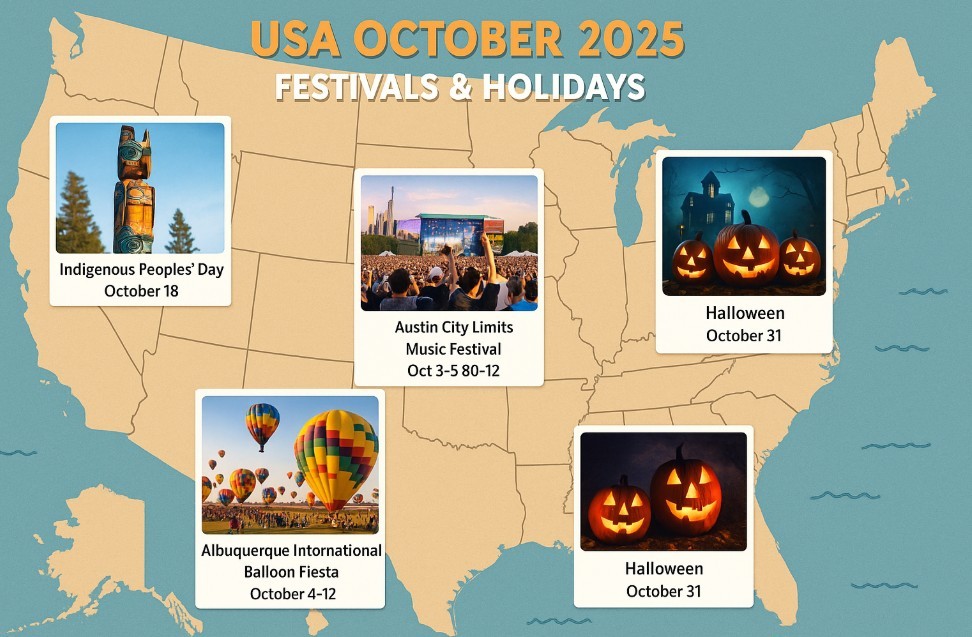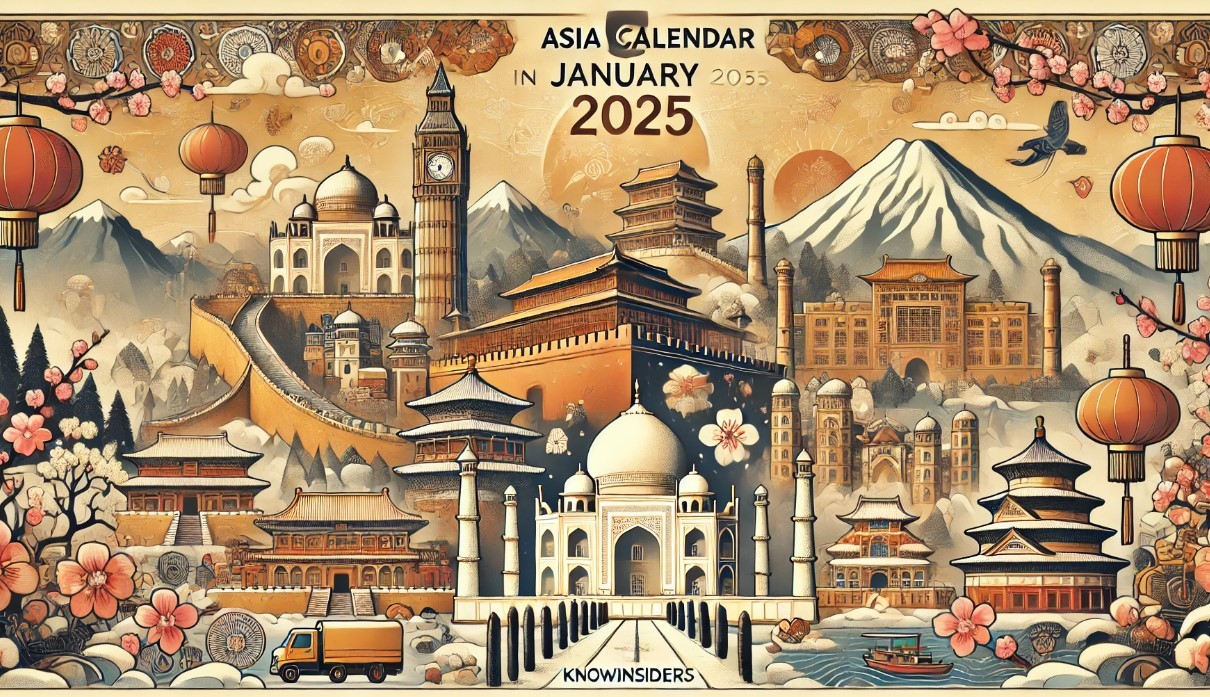Africa Calendar 2025 - List of Public Holidays and Celebration
Africa, the world's second-largest and most culturally diverse continent, celebrates a rich tapestry of public holidays each year, reflecting its vast range of ethnicities, religions, and histories. African public holidays often serve as powerful symbols of national pride, cultural heritage, and unity. Many commemorate historical events like independence from colonial rule, while others honor religious occasions and local traditions.
In a rapidly changing world, these public holidays offer moments for communities to reflect on their history, strengthen social ties, and celebrate cultural heritage. They serve as reminders of each nation’s resilience and aspirations, uniting people in pride and hope for the future. Through these observances, African societies not only honor their past but also nurture the bonds that will carry their traditions and values forward for generations to come.
Learn more: 2025 South Africa Calendar - Full List of Public Holidays, Observances And Celebrations
In 2025, African countries will observe a variety of national and religious holidays, each with its unique cultural flair and significance.
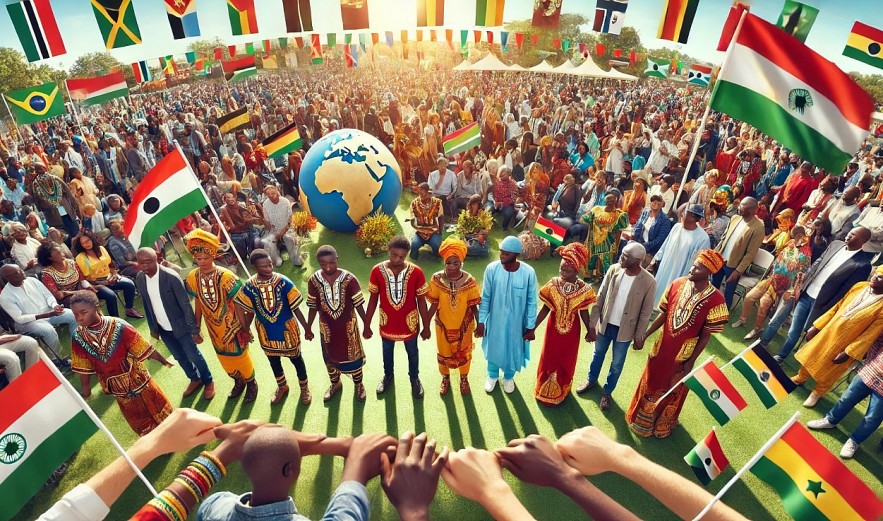 |
| Africa Day Celebrations with Pan-African Symbols |
Regional Variations in African Public Holidays
While Africa is unified by many shared experiences and cultural traditions, its public holidays vary significantly across regions, each shaped by unique historical and religious influences. Broadly, we can categorize African public holidays into several types: independence or liberation days, religious holidays (Christian and Islamic), and cultural or traditional observances.
North Africa: Predominantly Muslim, North African countries like Egypt, Algeria, and Morocco observe Islamic holidays such as Eid al-Fitr and Eid al-Adha with great fervor. Additionally, holidays honoring historical figures and independence, like Morocco’s Throne Day, are prominent.
West Africa: Known for its vibrant cultural diversity, West Africa has holidays celebrating independence and democracy, such as Nigeria's Democracy Day and Ghana’s Independence Day. Religious holidays, both Christian and Islamic, are also widely celebrated across the region.
East Africa: In East African nations like Kenya and Tanzania, national holidays honor both historical milestones (e.g., Jamhuri Day in Kenya) and religious observances, including Easter and Eid. East Africa’s public holidays also showcase traditional ceremonies and unique local events.
Central Africa: With a mix of Christian, traditional, and Islamic influences, Central African countries like Cameroon and the Democratic Republic of the Congo observe diverse holidays that reflect their multicultural heritage.
Southern Africa: Southern African nations, especially South Africa, observe holidays commemorating their long struggles against apartheid and colonial rule. Days like Freedom Day and Heritage Day are celebrated alongside Christmas, Easter, and other major Christian holidays.
Full List of Public Holidays in African Countries in 2025 by Month
January
-
New Year’s Day (January 1): This global celebration marks the start of a new year, but in Africa, it’s infused with regional customs and traditions. In countries like Nigeria, Kenya, and South Africa, families gather, exchange wishes, and celebrate with meals. Many cities host fireworks and public gatherings to welcome the new year.
-
Coptic Christmas (January 7): For Orthodox Christians in Ethiopia and Egypt, January 7 marks the birth of Jesus. This day is filled with religious reverence and community celebrations. Churches hold late-night masses, and the faithful come together in their finest traditional attire, fasting, and feasting afterward with family.
-
Timkat (January 19): Celebrated only in Ethiopia, Timkat commemorates the baptism of Jesus in the Jordan River. This colorful holiday includes vibrant processions, chanting, and symbolic river or pool immersions by the faithful. It’s a unique display of Ethiopian Orthodox culture, deeply rooted in Christian traditions.
February
-
National Heroes’ Day (February 1, Rwanda): A day to honor Rwandan heroes, especially those who have made sacrifices for peace and unity in the country. Rwanda celebrates with ceremonies, parades, and speeches commemorating national heroes who played pivotal roles in the country’s history.
-
Independence Day (February 16, Libya): Libya’s Independence Day is a national observance of the country’s liberation from colonial rule. Celebrations include parades, cultural events, and political gatherings that foster a sense of national pride.
-
Shaheed Day (Martyrs’ Day) (February 21, Libya): This holiday honors those who sacrificed their lives for the nation’s freedom and is commemorated with public memorials and events dedicated to the fallen heroes.
March
-
Independence Day (March 6, Ghana): Marking Ghana’s independence from British colonial rule in 1957, this day celebrates the country’s rich history and heritage with parades, flag-raising ceremonies, and cultural performances. It’s a day of pride and unity for Ghanaians.
-
National Tree Planting Day (March 12, Malawi): This environmental holiday encourages Malawians to plant trees, combat deforestation, and promote environmental sustainability. Schoolchildren, government officials, and community groups participate in tree-planting activities across the country.
-
Human Rights Day (March 21, South Africa): Commemorating the Sharpeville Massacre in 1960, Human Rights Day serves as a reminder of the struggles against apartheid and the importance of human rights. It’s a day of reflection, reconciliation, and unity in South Africa.
April
-
Independence Day (April 4, Senegal): Senegalese Independence Day marks the country’s separation from French colonial rule. This holiday is celebrated with parades, music, and dance performances, all highlighting the country’s rich culture and history.
-
Genocide Memorial Day (April 7, Rwanda): A day of somber remembrance for those lost in the 1994 genocide, with commemorative ceremonies, prayers, and speeches that emphasize healing, peace, and unity among Rwandans.
-
Easter (April 18 & 21, Christian observance): Many African countries, including Nigeria, Kenya, and South Africa, celebrate Good Friday and Easter Sunday with religious services, parades, and family gatherings. Easter signifies the resurrection of Jesus Christ and is one of the most celebrated Christian holidays across Africa.
-
Freedom Day (April 27, South Africa): Marking the first democratic elections in 1994, Freedom Day is celebrated with patriotic events, speeches, and parades. It’s a day for South Africans to reflect on their hard-won freedom and unity.
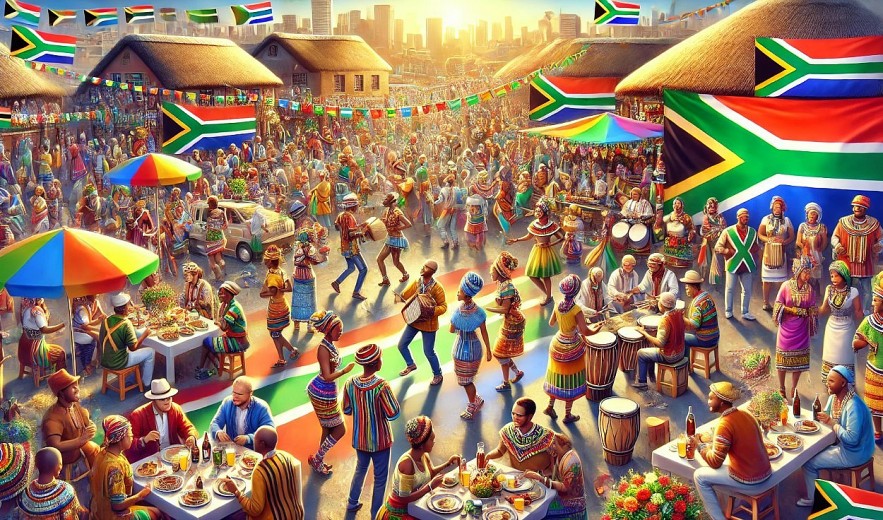 |
| Heritage Day Festival in South Africa |
May
-
Labor Day (May 1, Africa-wide): Known also as Workers’ Day, Labor Day is celebrated across Africa with parades, speeches, and gatherings organized by labor unions. It’s a day to recognize and honor the contributions of workers to society.
-
Cassinga Day (May 4, Namibia): In memory of those who died in the 1978 Cassinga Massacre, this day serves as a remembrance of Namibian resilience and the nation’s fight for independence, commemorated with memorials and national pride events.
-
Africa Day (May 25): Celebrated across multiple African countries, Africa Day marks the foundation of the Organization of African Unity (now the African Union) and is celebrated with concerts, panel discussions, and festivals that honor African unity and heritage.
June
-
Madaraka Day (June 1, Kenya): This holiday commemorates Kenya’s self-governance from Britain in 1963. Celebrations include parades, speeches, and patriotic displays in cities and villages across Kenya.
-
Democracy Day (June 12, Nigeria): This Nigerian holiday commemorates the country’s transition to democratic governance in 1999. It is marked by speeches, educational events, and celebrations honoring democratic values.
-
Youth Day (June 16, South Africa): Honoring the youth who protested against apartheid in 1976, this day includes events to inspire South African youth and remember their pivotal role in the country’s struggle for equality.
July
-
Independence Day (July 1, Somalia): This day commemorates the union of British and Italian Somaliland, marking Somalia’s full independence. Celebrations feature parades and national pride events.
-
Revolution Day (July 23, Egypt): Marking the 1952 revolution that led to Egypt’s independence from monarchy, this holiday is celebrated with military parades, speeches, and national pride events across Egypt.
-
Throne Day (July 30, Morocco): This Moroccan holiday celebrates King Mohammed VI’s accession to the throne with patriotic events, parades, and festivities showcasing Morocco’s royal heritage.
August
-
Independence Day (August 1, Benin): Benin’s Independence Day is celebrated with parades, music, and dance, honoring the country’s freedom from French rule.
-
Heroes’ Day (August 11, Zimbabwe): A national holiday honoring the contributions of Zimbabwe’s liberation fighters. Ceremonies and speeches pay tribute to the courage and sacrifice of national heroes.
-
Assumption Day (August 15): Observed in countries with significant Catholic populations, including Senegal and Madagascar, this religious holiday commemorates the assumption of the Virgin Mary.
September
-
Somhlolo Day (September 6, Eswatini): Celebrating King Somhlolo, the founder of the Swazi nation, this day includes traditional music, dance, and ceremonies in honor of Eswatini’s heritage.
-
Heritage Day (September 24, South Africa): South Africans celebrate their diverse cultural heritage with festivals, traditional clothing, music, and food. The day promotes unity through diversity.
-
Meskel (September 27, Ethiopia): An important religious festival, Meskel commemorates the discovery of the True Cross. Colorful processions and large bonfires are hallmarks of this unique Ethiopian holiday.
October
-
Independence Day (October 1, Nigeria): Nigeria celebrates its independence from Britain with parades, cultural performances, and community gatherings that showcase Nigerian pride and cultural diversity.
-
Mashujaa (Heroes’) Day (October 20, Kenya): Known as Heroes’ Day, this holiday honors those who contributed to Kenya’s fight for independence with public ceremonies, parades, and educational events.
-
Peace and Reconciliation Day (October 4, Mozambique): Commemorating the signing of the peace agreement that ended Mozambique’s civil war, this day is marked by events promoting peace and unity.
November
-
Revolution Day (November 1, Algeria): Commemorating the start of the Algerian War of Independence, Revolution Day is celebrated with parades, speeches, and events reflecting national pride and resilience.
-
Green March Day (November 6, Morocco): A patriotic holiday in Morocco that commemorates the 1975 Green March, asserting Morocco’s claim over Western Sahara. Parades, speeches, and public celebrations mark the day.
-
Independence Day (November 11, Angola): Angolans celebrate independence from Portuguese rule with parades, concerts, and festivities celebrating the nation’s rich history and culture.
December
-
Jamhuri Day (December 12, Kenya): Celebrating Kenya’s transition to a republic, Jamhuri Day is marked with patriotic events, speeches, and cultural performances showcasing Kenyan heritage.
-
Day of Reconciliation (December 16, South Africa): Observed to promote unity and reconciliation, this holiday features events and speeches that foster social harmony and reflection.
-
Christmas Day (December 25): Across Africa, Christian communities celebrate Christmas with church services, family gatherings, and festive meals. In Ethiopia, the Julian calendar shifts the observance to January 7.
-
Boxing Day (December 26): Following Christmas, Boxing Day is celebrated in countries like South Africa and Nigeria. It’s a day of charitable giving, family outings, and continued festive gatherings.
Religious Holidays Across Africa
Africa’s religious landscape is richly diverse, with both Islamic and Christian holidays celebrated across the continent. These religious holidays—Eid al-Fitr, Eid al-Adha, Good Friday, Easter, and Christmas—are observed by millions and highlight the unique cultural expressions within African societies.
Eid al-Fitr, marking the end of Ramadan, is widely celebrated by Muslim communities in North, West, and East Africa. In countries like Nigeria, Senegal, and Kenya, Eid al-Fitr is not only a day of prayer but also one of charity and communal feasting. Families dress in new clothes, prepare traditional foods, and exchange gifts. Zakat al-Fitr, an obligatory charitable donation, is given to ensure those in need can also participate in the celebrations, reinforcing values of community support and generosity.
Eid al-Adha, or the "Festival of Sacrifice," is celebrated approximately two months after Eid al-Fitr. Across Africa, this day commemorates the willingness of Prophet Ibrahim to sacrifice his son in obedience to God. In Morocco, Algeria, and Sudan, families gather for prayers and a ceremonial animal sacrifice, symbolizing faith and devotion. The meat is then divided, with a portion given to the poor, embodying principles of empathy and generosity. Eid al-Adha often includes visits to extended family, fostering unity and shared joy.
Good Friday and Easter, among Christian communities, honor the crucifixion and resurrection of Jesus Christ. Celebrations vary from solemn observances to joyous processions. In South Africa, Good Friday is marked with candlelight services, while in Ethiopia, Easter (Fasika) follows a period of fasting and prayer. African Easter traditions include family gatherings, preparing unique holiday meals, and community services. Churches are often decorated with vibrant colors, and in regions such as Uganda, communal feasts bring people together to celebrate the holiday.
Christmas is widely celebrated by Christian populations in countries like Nigeria, Ghana, and Kenya. African Christmas traditions include both religious observances and cultural festivities. Midnight church services, where worshippers dress in their finest clothes, are common across the continent. In Ethiopia, which follows the Julian calendar, Christmas is celebrated on January 7 with a service and feast known as "Genna." Elsewhere, gift-giving, music, and festive meals add to the joy, reflecting a blend of religious devotion and cultural expression.
These religious holidays hold deep significance and are celebrated with unique cultural elements across African countries. They emphasize themes of faith, family, community, and charity, reinforcing shared values that connect communities across the continent.
Unique National Holidays
African countries also observe numerous unique national holidays that celebrate local heroes, cultural heritage, and ecological awareness. These holidays reflect the diversity of Africa’s cultural landscape and emphasize national pride and identity.
National Heroes’ Days are celebrated in various forms across Africa, honoring individuals who contributed to each country’s independence and freedom. In Zimbabwe, Heroes’ Day in August commemorates the sacrifices of liberation fighters who fought for independence. This day includes parades, speeches, and commemorative ceremonies. Kenya’s Mashujaa Day (Heroes’ Day) in October similarly honors those who contributed to Kenya’s independence, with public gatherings and educational events celebrating Kenyan resilience and history.
In Namibia, Cassinga Day on May 4 commemorates the tragic Cassinga massacre, a defining event in the country’s struggle for independence. The day is observed with solemn memorials and gatherings, honoring those who lost their lives and highlighting the resilience of the Namibian people.
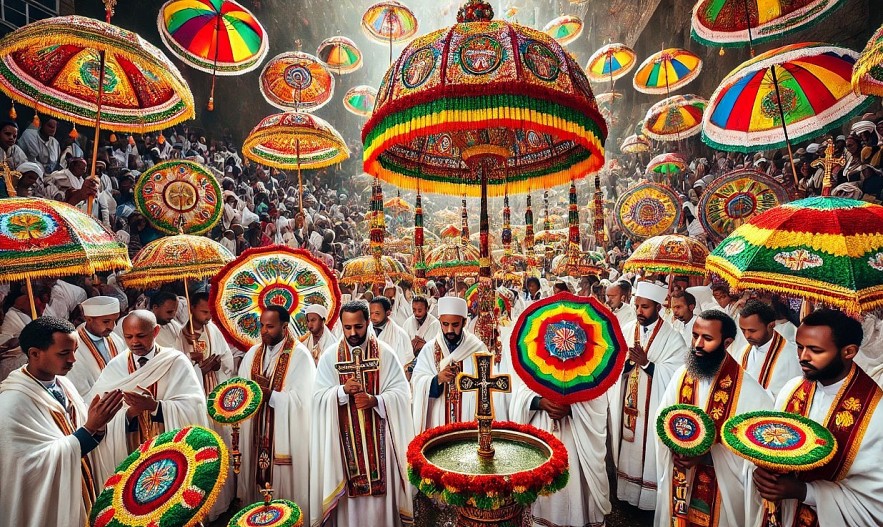 |
| Ethiopian Timkat Festival Procession |
Several African nations observe holidays with tribal and cultural significance that celebrate local customs. For example, Timkat in Ethiopia is a vibrant festival that commemorates the baptism of Jesus and includes processions, music, and water blessings. This holiday uniquely reflects Ethiopian Orthodox traditions, with worshippers carrying replicas of the Ark of the Covenant, symbolizing religious devotion and cultural heritage.
Ecological holidays like National Tree Planting Day in Malawi emphasize environmental conservation. On this day, Malawians come together to plant trees, combat deforestation, and raise awareness about ecological responsibility. Such holidays encourage sustainable practices and demonstrate Africa’s commitment to preserving its natural resources.
These unique holidays highlight Africa’s rich history, local traditions, and ecological priorities, contributing to a stronger sense of identity and unity among communities.
Conclusion
African public holidays are more than just dates on a calendar; they represent the cultural, spiritual, and national identities that form the continent’s diverse tapestry. From religious celebrations to national commemorations, these holidays play a vital role in uniting communities, honoring shared values, and preserving the unique traditions that distinguish each African nation.
FAQs: Public Holidays in African Countries 2025
1. Are public holidays in Africa the same across all countries?
No, public holidays in Africa vary widely across countries. While some holidays like New Year’s Day and Labor Day are widely observed, other holidays are unique to each nation’s history, culture, or religion. For example, Nigeria celebrates Democracy Day to mark its transition to democracy, while South Africa observes Freedom Day to honor the end of apartheid.
2. What are the most commonly celebrated religious holidays in Africa?
The most widely celebrated religious holidays in Africa include Christian observances like Good Friday, Easter, and Christmas, as well as Islamic holidays such as Eid al-Fitr and Eid al-Adha. These holidays are celebrated with unique cultural expressions across African countries, with specific traditions varying by region and religious community.
3. How do African countries celebrate their independence days?
Independence days are celebrated with national pride across African nations. Celebrations typically include parades, cultural performances, speeches, and community events that reflect each country’s history and achievements. Countries like Ghana, Nigeria, and Kenya observe their independence days as major national holidays, often with a focus on unity and reflection on the journey to independence.
4. Are there holidays specific to certain cultural or tribal groups in Africa?
Yes, several African countries celebrate holidays that are culturally or tribally significant. For instance, Timkat in Ethiopia is an Orthodox Christian holiday unique to Ethiopian culture, commemorating the baptism of Jesus with processions and water blessings. In Eswatini, Somhlolo Day celebrates the founding of the Swazi nation and includes traditional music and dance that honor Swazi heritage.
5. What role do environmental holidays play in African countries?
Environmental holidays, such as National Tree Planting Day in Malawi, raise awareness about ecological issues and promote conservation efforts. These holidays encourage sustainable practices, such as tree planting, which help address deforestation and promote environmental stewardship within local communities.
6. Are there holidays celebrating African unity or pan-Africanism?
Yes, Africa Day on May 25 is celebrated across the continent to commemorate the founding of the African Union (formerly the Organization of African Unity). Africa Day includes concerts, festivals, and discussions that highlight the importance of African unity, heritage, and shared aspirations for the future.
7. How do African countries observe major Christian and Islamic holidays differently from other regions?
While major Christian and Islamic holidays are observed worldwide, African countries add unique cultural elements to these celebrations. For example, Easter in Uganda often involves large community gatherings and feasts, while Eid al-Fitr in Senegal is known for its vibrant street processions and communal prayers. In Ethiopia, Christmas (Genna) is celebrated on January 7 with traditional dances and festive meals unique to Ethiopian culture.
8. Are there public holidays dedicated to national heroes in Africa?
Yes, many African countries have holidays dedicated to honoring national heroes who contributed to the country’s independence or national identity. For example, Heroes’ Day in Zimbabwe and Mashujaa Day (Heroes’ Day) in Kenya honor individuals who fought for freedom and made significant contributions to the nation. These holidays often include parades, public ceremonies, and speeches honoring the sacrifices of national heroes.
9. Do African countries observe international holidays?
Yes, several African countries observe international holidays like Labor Day on May 1, which celebrates workers’ rights, and World AIDS Day on December 1, promoting awareness and support for those affected by HIV/AIDS. These international observances reflect Africa’s connection to global issues and movements.
10. How do African public holidays promote community and cultural preservation?
Public holidays in Africa are powerful occasions for cultural expression and community bonding. They allow people to come together to celebrate shared values, remember historical milestones, and pass down traditions to younger generations. Whether through religious observances, independence celebrations, or unique cultural festivals, these holidays strengthen community ties and preserve cultural heritage across African societies.
 Top 10 Biggest and Most Majestic Hydroelectric Plants in Africa Top 10 Biggest and Most Majestic Hydroelectric Plants in Africa Africa has an abundance of water systems, which has led to a rise in the building of large dams to control the distribution of water ... |
 Top 10 Biggest Companies In Africa Based on Market Capitalization (2024 Report) Top 10 Biggest Companies In Africa Based on Market Capitalization (2024 Report) We put together the biggest companies in Africa by market value. Because they know there is a huge market in Africa, these companies have helped ... |
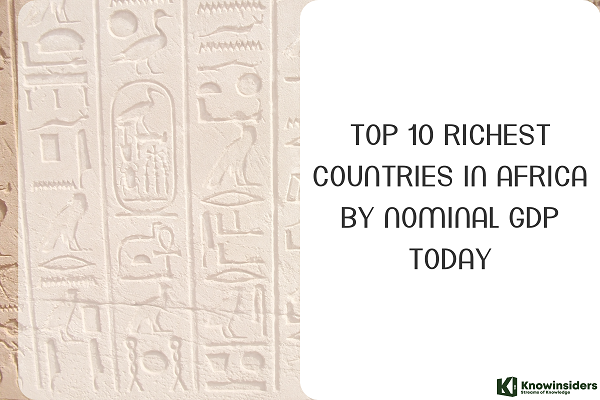 Top 10 Wealthiest African Countries Based on Nominal GDP Top 10 Wealthiest African Countries Based on Nominal GDP This article ranks Africa's ten wealthiest nations by GDP to show the continent's economic diversity. These strengths demonstrate Africa's economic power and help explain its ... |
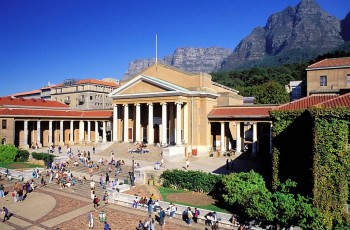 Top 15 Best Universities in Africa for 2025 - QS Rankings Top 15 Best Universities in Africa for 2025 - QS Rankings Africa is a shining example of a dynamic center for intellectual brilliance thanks to its varied cultures and fast improving educational infrastructure. These outstanding African ... |

